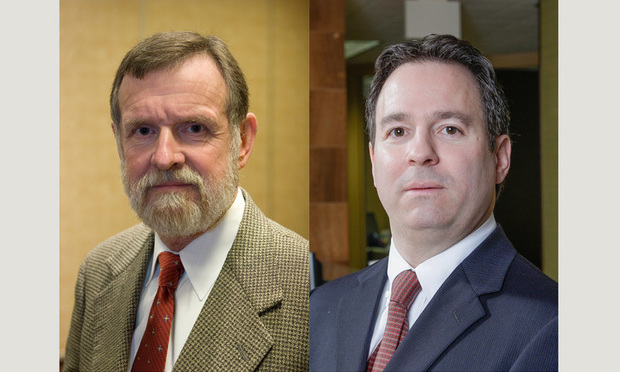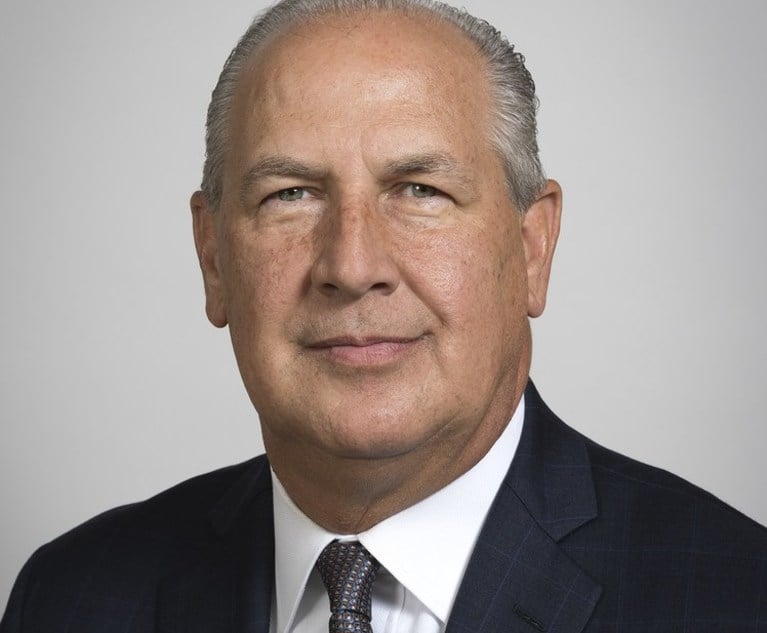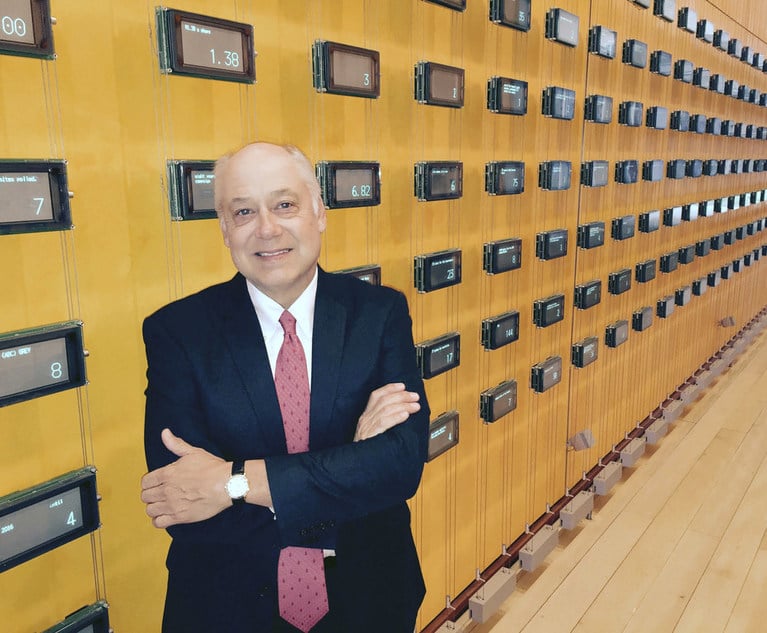Allegations of 'Self-Dealing' in Fee Fight Might Spur Pelvic Mesh Judge to Step Into Fray
According to court watchers, allegations that arose recently in the contentious fee dispute should give any judge pause, and may lead Judge Joseph Goodwin, who is overseeing the vast pelvic mesh litigation, to call for further investigation of the claims before he allocates an estimated $550 million in disputed fees.
April 23, 2019 at 05:18 PM
8 minute read
The original version of this story was published on Law.com
 Henry Garrard, left, and Adam Slater, right.
Henry Garrard, left, and Adam Slater, right.
Although allegations of fee-padding and self-dealing have roiled the pelvic mesh multidistrict litigation, the judge overseeing the consolidated lawsuits is under no obligation to investigate those claims.
But that does not necessarily mean U.S. District Judge Joseph Goodwin of the Southern District of West Virginia will turn a blind eye either.
According to court watchers, allegations that arose recently in the contentious fee dispute should give any judge pause, and may lead Goodwin, who is overseeing the vast litigation, to call for further investigation of the claims before he allocates an estimated $550 million in disputed fees.
“It seems to me the court more or less has to look into these allegations in deciding the fee dispute, and the fact that the court itself appointed this committee sounds like a further reason why the court should be interested in whether they're behaving properly,” Rutgers University professor John Leubsdorf said.
Infighting Over Fees
The allegations arose in court filings late last month—about two weeks after the fee and compensation committee and Daniel Stack, a retired Illinois state court judge appointed to review the fee allocation process, issued their final recommendations on how to allocate the fees among 94 firms each claiming they did work for the “common benefit” of the MDL.
Specifically, Roseland, New Jersey, attorney Adam Slater of Mazie Slater Katz & Freeman wrote in a March 26 objection that plaintiffs attorney Bryan Aylstock pressured the chairman of the fee and compensation committee, Henry Garrard, to boost the amount of attorney fees to Aylstock's Pensacola, Florida-based firm, Aylstock, Witkin, Kreis & Overholtz, which ultimately got $10 million more. According to the objection, Aylstock threatened that his colleague, D. Renée Baggett, a member of the fee and compensation committee, would not sign off on its preliminary written recommendation if Garrard, of Blasingame, Burch, Garrard & Ashley in Athens, GA, refused to increase the fees for Aylstock's firm.
Slater and fellow Mazie Slater partner David Mazie filed separate declarations insisting that Stack had relayed the information at a Jan. 3 meeting with them.
“Judge Stack stated that he 'was sickened' and 'angered' by this conduct, which he described as Mr. Aylstock pressuring the FCC chairman when he was particularly vulnerable,” Slater wrote in his firm's objection. “Judge Stack explained that he could not recommend the far lower amount he believed Aylstock deserved since he was, as he termed it, 'put in a box' since the agreement with the Aylstock firm included assurance that Judge Stack would not reduce the agreed-upon award.”
The objection also accused Motley Rice of padding its bills in the mesh litigation.
“Similarly, Judge Stack stated that he believed that Motley Rice (like some others in the litigation) had inflated its contributions and had 'padded' its time with thousands of phantom hours,” Slater wrote. Stack told him that Motley Rice did that “in every litigation,” according to the objection.
Shanin Specter, of Kline & Specter, also filed a March 26 objection that raised similar concerns, contending that Stack “simply rubberstamped” the FCC's recommendations.
When reached for comment Tuesday, Specter said the filings raise serious allegations, and that attorneys should have a right to appeal decisions regarding the fee dispute—an issue that is currently being disputed before the U.S. Court of Appeals for the Fourth Circuit.
“As we said in our filing, firms, especially Mazie Slater, have raised troubling concerns about what's occurred in relation to the attorney fee issue,” he said. “Good lawyers are going to be deterred from getting involved in MDLs if they think that the rules can be changed in the middle of proceedings and there's no right of appeal.”
Slater and Rice declined to comment about the dispute, and Aylstock did not return a message for comment Tuesday.
Garrard said he could not comment beyond the FCC's court filings.
The FCC, however, has made counterclaims against the objecting firms, accusing them of collectively making false attacks and submitting bills “riddled with excessive entries, duplicative billing” and other problems.
Garrard also specifically called Slater's account of Alystock's fee request false, stating that he “has never felt taken advantage of by this firm.”
“The FCC evaluated the Aylstock firm's submission by the same criteria as every other firm, which included the opportunity to provide and receive feedback and to be heard,” Garrard wrote.
The use of such “caustic rhetoric” was “unfortunate,” he added.
“It serves no legitimate purpose for these objectors to air personal grievances or what they apparently believe to be 'dirty laundry' regarding alleged conversations with FCC members or with the external review specialist save perhaps to embarrass or insult,” he wrote.
But it is unlikely that response will be the end of the dispute.
Objecting attorneys have since filed replies, contesting the FCC's accounts. And, although the court has shot down previous requests for discovery regarding the fee allocations, on Monday attorney Benjamin H. Anderson of Anderson Law Offices in Cleveland filed a motion requesting a hearing.
“The eight members' claims of having actually performed the work needed to justify their recovery of two-thirds of the common benefit fund are simply implausible and cannot withstand scrutiny,” Anderson said.
Anderson also did not return a call for comment.
Where Can Courts Go From Here?
Several attorneys said that, although contentious fee disputes are commonplace in big cases, the allegations raised in pelvic mesh are outside the norm, and could lead to a variety of actions by the court depending on what allegations may get substantiated and what allegations might be shown to be false.
Court watchers noted that, unlike in class action litigations, there are no codified duties for judges presiding over MDLs to delve into the particulars of a fee dispute, and often courts simply follow the recommendations of the special master tasked with reviewing the dispute.
However, at least one attorney said there is some case law that might fall in favor of transparency, most recently a decision by U.S. District Judge Robert Kugler in In re Benicar Products Liability Litigation, which, earlier this month, issued an order saying, among other things, that all firms involved in the litigation will be given access to submissions made to the common benefit committee.
The statute governing MDLs is “barebones,” according to Penn Law professor Stephen Burbank, so disputes often arise about exactly what powers a court can exercise. Courts are also generally reluctant to redo the work performed by special masters who oversee fee disputes, but still, Burbank said, courts generally want to review fee submissions thoroughly.
“The incentives for passing and for unfair allocation on the basis of what I'll call politics rather than effort are pretty high, and most judges know this,” Burbank said. “It would be very, very surprising if a judge in any context just accepted what a lawyer is proposing.”
Despite the lack of specific rules, courts generally seek to exercise broad discretion when it comes to fee disputes, Burbank said, and so a credible allegation of impropriety could set the whole fee allocation process back numerous steps.
“That might make me think, well maybe my assumption about the total amount is wrong,” Burbank said.
Among other things, judges facing serious allegations in fee disputes can hold hearings regarding the disputed hours and the rates, attorneys said. Courts can also call for further evidence and depositions, and, depending on the findings, there could even be disciplinary implications.
Ethics attorney Thomas G. Wilkinson Jr. of Cozen O'Connor said there is little oversight regarding what exactly a “reasonable fee” should be, but, knowingly making false statements can run afoul of ethics laws regarding candor to the court.
“Any kind of knowingly false statement to the court could have disciplinary consequences,” Wilkinson said.
Federal courts are somewhat limited in what they can do if a violation has been found to have occurred, and generally their options are imposing monetary sanctions, or revoking an attorney's pro hac vice admission. Any proceedings regarding an attorney's law license would have to first be initiated by the disciplinary body of the attorney's home state.
Wilkinson said state disciplinary boards “most always will investigate further” if an issue has been brought to them via a judge's opinion.
However, he noted that, without a request from attorneys, courts have no duty to sanction lawyers found to have run afoul of the ethics rules.
“There's no duty on the part of a judge to send an issue to the disciplinary body,” Wilkinson said. “Even if the judge concludes there was a violation.”
Amanda Bronstad contributed to this report.
This content has been archived. It is available through our partners, LexisNexis® and Bloomberg Law.
To view this content, please continue to their sites.
Not a Lexis Subscriber?
Subscribe Now
Not a Bloomberg Law Subscriber?
Subscribe Now
NOT FOR REPRINT
© 2025 ALM Global, LLC, All Rights Reserved. Request academic re-use from www.copyright.com. All other uses, submit a request to [email protected]. For more information visit Asset & Logo Licensing.
You Might Like
View All
Montgomery McCracken Touts 'Record' Financial Performance Despite Shrinking Head Count
6 minute read
Class Action Settlements Totaled $40B+ Three Years in a Row: 'We’re in a New Era'
5 minute read
AI's Place in Big Law Broadens, As Firms Embrace Fresh Uses of the Technology
Trending Stories
Who Got The Work
J. Brugh Lower of Gibbons has entered an appearance for industrial equipment supplier Devco Corporation in a pending trademark infringement lawsuit. The suit, accusing the defendant of selling knock-off Graco products, was filed Dec. 18 in New Jersey District Court by Rivkin Radler on behalf of Graco Inc. and Graco Minnesota. The case, assigned to U.S. District Judge Zahid N. Quraishi, is 3:24-cv-11294, Graco Inc. et al v. Devco Corporation.
Who Got The Work
Rebecca Maller-Stein and Kent A. Yalowitz of Arnold & Porter Kaye Scholer have entered their appearances for Hanaco Venture Capital and its executives, Lior Prosor and David Frankel, in a pending securities lawsuit. The action, filed on Dec. 24 in New York Southern District Court by Zell, Aron & Co. on behalf of Goldeneye Advisors, accuses the defendants of negligently and fraudulently managing the plaintiff's $1 million investment. The case, assigned to U.S. District Judge Vernon S. Broderick, is 1:24-cv-09918, Goldeneye Advisors, LLC v. Hanaco Venture Capital, Ltd. et al.
Who Got The Work
Attorneys from A&O Shearman has stepped in as defense counsel for Toronto-Dominion Bank and other defendants in a pending securities class action. The suit, filed Dec. 11 in New York Southern District Court by Bleichmar Fonti & Auld, accuses the defendants of concealing the bank's 'pervasive' deficiencies in regards to its compliance with the Bank Secrecy Act and the quality of its anti-money laundering controls. The case, assigned to U.S. District Judge Arun Subramanian, is 1:24-cv-09445, Gonzalez v. The Toronto-Dominion Bank et al.
Who Got The Work
Crown Castle International, a Pennsylvania company providing shared communications infrastructure, has turned to Luke D. Wolf of Gordon Rees Scully Mansukhani to fend off a pending breach-of-contract lawsuit. The court action, filed Nov. 25 in Michigan Eastern District Court by Hooper Hathaway PC on behalf of The Town Residences LLC, accuses Crown Castle of failing to transfer approximately $30,000 in utility payments from T-Mobile in breach of a roof-top lease and assignment agreement. The case, assigned to U.S. District Judge Susan K. Declercq, is 2:24-cv-13131, The Town Residences LLC v. T-Mobile US, Inc. et al.
Who Got The Work
Wilfred P. Coronato and Daniel M. Schwartz of McCarter & English have stepped in as defense counsel to Electrolux Home Products Inc. in a pending product liability lawsuit. The court action, filed Nov. 26 in New York Eastern District Court by Poulos Lopiccolo PC and Nagel Rice LLP on behalf of David Stern, alleges that the defendant's refrigerators’ drawers and shelving repeatedly break and fall apart within months after purchase. The case, assigned to U.S. District Judge Joan M. Azrack, is 2:24-cv-08204, Stern v. Electrolux Home Products, Inc.
Featured Firms
Law Offices of Gary Martin Hays & Associates, P.C.
(470) 294-1674
Law Offices of Mark E. Salomone
(857) 444-6468
Smith & Hassler
(713) 739-1250






